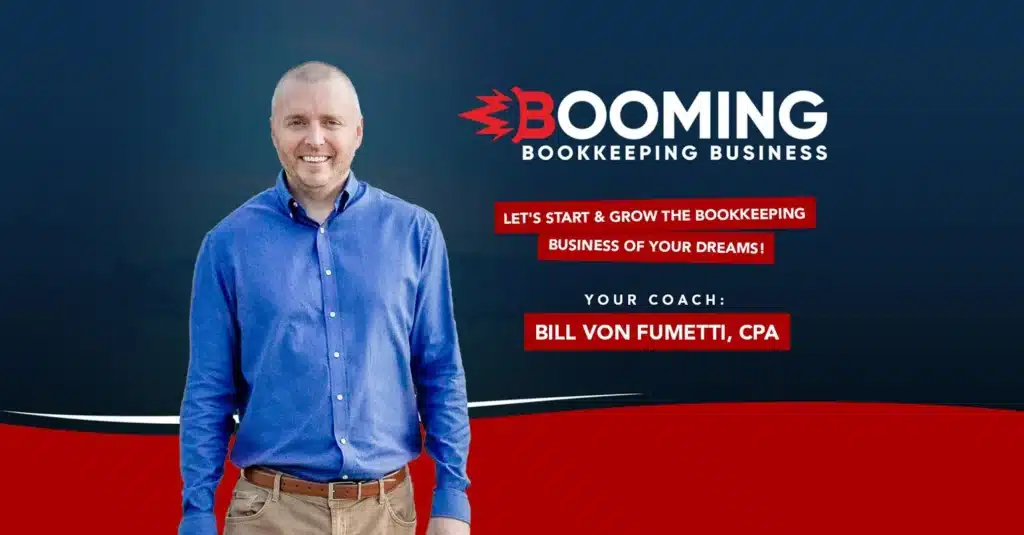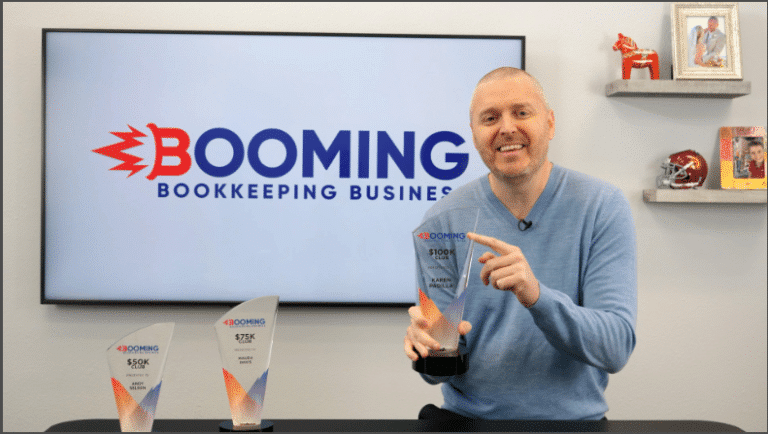Booming Bookkeeping Business Review (2025): Real Results, Pros & Cons

This post contains affiliate links. If you make a purchase through these links, we may earn a small commission at no extra cost to you. We only recommend products we genuinely believe in.
This Booming Bookkeeping Business review provides the bottom line in plain English: BBB is a real, mentorship-based program that enables bookkeeping newbies, switchers, and CPAs transitioning into client work to get a genuine bookkeeping practice up and running, quick fast. The main path takes approximately 6–8 weeks at 5–10 hours per week, and many students indicate acquiring initial clients as they progress through the modules; your schedule really depends on regular outreach and offer clarity. What sets the program apart is the marketing-dominated playbook plus weekly group coaching, lifetime access, and live community—so you’re not left with just videos. You’ll learn the basics, QuickBooks Online workflows, prices, proposals, onboarding, and discoveries you can execute. No actual certification is included (pairing with QuickBooks ProAdvisor is a savvy move), and hands-on experience is self-directed, but the checklists, worksheets, and coaching assistance narrow the path toward your initial (and next) paying clients. If you desire coaching and accountability, BBB is the way.
Table of Contents
- Booming Bookkeeping Business Review (2025): Real Results, Pros & Cons
- Pros & Cons
- BBB vs. Bookkeeper Launch
- The Core Offering: What You Actually Get
- Course Summary:
- Real-World Outcomes: Student Success Stories
- Independent Analysis and Outside Insights
- Even Greater Examination of Strengths and Possible Weaknesses
- The Most Common Complaints About Booming Bookkeeping Business
- 1. “Live” Live Streams that are Actually Pre-Recorded
- 2. The $5,000 Mentorship Investment
- 3. High-Energy and Motivational Sales Approach
- 4. The Free Challenge as an Introduction, Not a Full Course
- 5. Testimonials and Structured Engagement
- 6. Established Marketing Strategies
- 7. Income Expectations and Earning Potential
- 8. Communication and Community Management
- 9. Financial Commitment and Personal Responsibility
- 10. Student Outcomes and Individual Results
- The Bottom Line
- Who is Booming Bookkeeping Business suitable for?
- FAQ
For those who dream of establishing a virtual bookkeeping business, the “Booming Bookkeeping Business” program, crafted by CPA Bill Von Fumetti, emerges as an all-encompassing solution. This thorough review delves into the course’s curriculum, mentorship model, and student outcomes, offering a vivid insight into what potential participants can anticipate.
Short Verdict: The Booming Bookkeeping Business is a dynamic mentorship program, meticulously crafted with a step-by-step approach that intertwines on-demand training with weekly coaching sessions and offers lifetime access to a nurturing community. It proves particularly beneficial for beginners and those in the midst of a career transition, providing a clear roadmap for launching their business alongside a comprehensive marketing playbook. Although the program does not confer formal certification, its strong emphasis on practical skills, client acquisition, and continuous mentorship effectively fills that void. Some learners may discover a desire for more hands-on practice than what is available, yet the vibrant community and coaching calls are thoughtfully designed to tackle real-world challenges as they emerge.
Pros & Cons
A fast snapshot before you dive deeper.
Pros
- Clear launch path from fundamentals → QuickBooks Online → business setup → pricing → outreach.
- Marketing-forward curriculum (multi-channel tactics, discovery call scripts, profile optimization).
- Weekly coaching + active community + lifetime access (not just videos).
- Templates, checklists, and pricing guidance shorten time to first client.
- Beginner- and career-switcher-friendly; practical over theory.
- Created by a practicing CPA; strategies are current and client-tested.
- Flexible outcomes: part-time side income or selective, higher-value client roster.
Cons
- No formal certification included (pair with QuickBooks ProAdvisor for credibility).
- Hands-on practice is largely self-directed (use QBO sample companies as you learn).
- Pricing/terms can change—always verify the current offer page before enrolling.
- Outcomes vary with execution (consistent outreach and offer clarity are essential).
- Primary software focus is QuickBooks Online; plan to supplement if you prefer Xero/Wave.
BBB vs. Bookkeeper Launch
Which path fits your goals, timeline, and learning style?
TL;DR: Choose BBB for a faster, marketing-heavy path with weekly coaching. Choose Bookkeeper Launch for a broader, more exhaustive curriculum and a longer runway. Always confirm current pricing, support tiers, and policies.
| Feature | Booming Bookkeeping Business | Bookkeeper Launch |
|---|---|---|
| Scope & depth | Focused, streamlined; built to get market-ready quickly | Broader and more exhaustive; more material to work through |
| Time to complete | ≈ 6–8 weeks typical at 5–10 hrs/wk (flexible) | Generally longer runway due to breadth |
| Marketing emphasis | High: scripts, platform playbooks (Google/LinkedIn/Yelp/ProAdvisor) | High within a larger curriculum |
| Practice & assignments | Self-directed QBO practice; fewer formal exercises | Typically more built-in exercises/depth |
| Certification | No formal license; pair with QuickBooks ProAdvisor | No industry license; pair with QuickBooks ProAdvisor |
| Support model | Weekly group coaching, active community, lifetime access | Community + coaching (verify package specifics) |
| Ideal learner | Beginners/career-switchers; accountants moving into client work; want accountability | Learners who want maximum curriculum depth |
| Pricing & policies | Varies over time; confirm current offer page | Varies over time; confirm current offer page |
How to choose (30-second checklist)
- Want to start outreach this month with a concrete plan and weekly coaching? BBB
- Prefer an ultra-comprehensive curriculum and don’t mind a slower pace? Bookkeeper Launch
- On the fence? Compare each program’s syllabus, coaching cadence, and refund policy this week, then commit for 60–90 days.
The Core Offering: What You Actually Get
The program is built on a structured curriculum that covers the essential pillars of a successful bookkeeping practice.

Course Summary:
Bookkeeping Fundamentals: For the beginner, the course gives a comprehensive grounding in bookkeeping principles, such as debit, credit, and financial statements.
QuickBooks Online Mastery: A significant part of the training is on learning QuickBooks Online, the industry standard software. Under the curriculum, the students are also trained on becoming a certified QuickBooks ProAdvisor, a valuable certification in gaining credibility.
Setting Up Business and Running It: This chapter provides a practical guidebook on the logistical aspects of setting up a business, including entity selection, legal formation, insurance, and how to get an EIN. It also includes key engagement letters and client onboarding checklists templates.
Marketing and Client Attraction: This is probably the strongest part of the program. It teaches you detailed methods on how to attract clients via a host of channels, including Google, Yelp, and LinkedIn. The key focus is increasing your Intuit ProAdvisor profile in order to attract inbound leads.
Pricing and Sales: The program equips students with tools like a pricing calculator and scripts to confidently handle discovery calls and price their services for maximum profitability.
Format and Access:
The course unfolds through self-paced video lessons, offering the freedom of flexibility. In addition, it is enhanced by weekly live group coaching calls with Bill Von Fumetti, providing students the opportunity to have their specific questions addressed. Furthermore, participants enjoy lifetime access to the course materials, along with membership in a private Facebook group designed for peer support and networking.
Pacing and Cost: The students generally take between six and eight weeks to complete the fundamental modules, as long as they dedicate approximately five hours per week. Throughout the decades, the price tag on the course has varied. Also, payment plans were given. It is always best, however, to go on the site that is official discover the latest prices.
Real-World Outcomes: Student Success Stories
The official Booming Bookkeeping Business website showcases a wide array of student success stories, highlighting the potential for significant income and improved work-life balance.
Reported student achievements include:



Many students can attest that they gained their initial clients even before they completed the program. While the official website prides itself on having a variety of favorable reviews, one must note that some third-party reviews depict variable results, insinuating that individual achievement is heavily dependent on the time and consistent efforts put in by the individual student.
To balance testimonials, scan independent customer feedback, see Booming Bookkeeping Business reviews on Trustpilot, for recurring themes on onboarding, responsiveness, and results.
Independent Analysis and Outside Insights
Independent reviewers all praise the course as being practical and having a solid focus on marketing. A bookkeeper/educator, who bothered to write a review, corroborated that the course tackles the basics, QuickBooks, the setup of businesses, and the onboarding of clients comprehensively, highlighting the depth of the marketing training and the advantage of access to coaching. However, this particular reviewer also noted the lack of official certification, and that some students may want more hands-on rehearsal. Prior to making your decision on joining, do work through independent employee commentary; glance at the Booming Bookkeeping Business Glassdoor reviews and evaluate the culture, the level of coaching consistency, and the operational support.
Other reviews by previous students refer to the program as “invaluable” when attempting to establish a bookkeeping business, complimenting the strong mentorship and support system that is provided. Some reviews, however, are critical and mention that the program is highly centred on sales and that certain information is attainable through other methods without expense.
Even Greater Examination of Strengths and Possible Weaknesses
Strengths
Clear Path to Launch: This initiative provides a smooth experience, leading the participants from learning the technical skills to launching the business and getting customers.
Actionable Marketing Strategies: A highlight on practical, multi-channel marketing is another frequently cited strength of the course.
A robust support system emerges from the synergy of weekly coaching calls, a private community, and unlimited email support, forming a sturdy safety net for new business owners.
Taught by a Working CPA, the course is designed and instructed by a practitioner who runs his own busy bookkeeping practice, ensuring that the methods taught are up-to-date and relevant.
Potential Drawbacks and Directions towards Relief:
No Formal Certification: It is true that bookkeeping is unregulated in the United States, which may be seen as a negative. In response, the course encourages students to become certified QuickBooks ProAdvisors, a valuable credential that is gratis and universal.
Limited Built-in Practice: Some reviewers have voiced a wish for more structured, hands-on practice exercises. Students can address this by making use of QuickBooks’ sample companies for practice and by presenting real-world questions during the coaching calls.
There is no assurance of success. The plan provides a template, but the student is still left with the duty of vigorously implementing the marketing and outreach tactics.
Cost: The course is a significant cash outlay. Potential students should consider the potential return on investment, as gaining just one or two clients often can repay the cost of the course.
The Most Common Complaints About Booming Bookkeeping Business
Booming Bookkeeping Business (BBB) in recent years collected varied ranges of feedback from customers through message boards, blogs, and other online forums. Some students have commented positively on the well-structured coaching and the in-depth introduction to the use of QuickBooks offered through the program, while others have complained or reflected unfulfilled expectations. Below is a summary of the most commonly voiced points of feedback—both criticisms and the reasons behind them—intended to provide a clearer, more balanced understanding of how the program is perceived among varied learners.
1. “Live” Live Streams that are Actually Pre-Recorded
Several attendees have commented that the 5-day “Keyboard Rich Challenge,” promoted as a live, interactive experience, is largely pre-recorded. Viewers have noticed repeated aspects—e.g., coordinated clothes, repeated QuickBooks examples, and a rhythmic pace in the videos—that suggest the core presentation isn’t being delivered in real time.
The plan, though, includes a live chat component for each session, which allows members to interact with personnel and other attendees, ask questions, and contribute insights while the session is in progress. It creates a dynamic, community-oriented atmosphere, in spite of the fact that the core video content material was previously recorded.
Although some expected a completely improvised live presentation, the pre-recorded style was designed so that the quality, pace, and technical consistency are always the same—making sure every participant, regardless of location, no matter the time zone, has the same high-gloss training experience. The live chat feature inserts an element of flair and interaction while eliminating the possibility of glitches and uneven presentation.
2. The $5,000 Mentorship Investment
Others were also shocked at the price of the Booming Bookkeeping Mentorship Program at $4,997 or three payments of $1,997 per month. Some noted that this was an apparently drastic price hike compared with the no-cost/ low-cost challenge and like a “high-ticket” sales pitch.
But the additional investment is a step from the initial challenge to a more intensive, in-depth mentoring experience. The program includes access to one-on-one coaching, full business-building templates, and continuous support—resources that inherently need more interaction and contact from the coaching team. Despite the fact that the payment plan with structure is a tad more than the upfront-lump plan, it’s industry standard in the online learning marketplace, designed to cover administrative and processing fees for payments in installments.
While some saw the window for making decisions as rapid, the enrollment with a time-sensitive deadline for the program tries to create dedication and maintain concentrated group cohorts, ensuring that all the people who take part begin together and move through the same points in alignment.
Ultimately, the mentoring is a worthwhile investment for the willing and prepared who are considering the creation of a sustainable bookkeeping practice, with the cost encompassing the intensive support and responsibility that are provided well beyond the complimentary challenge.
3. High-Energy and Motivational Sales Approach
Some commentators observed that the challenge’s uplifting and inspiring tone grows steadily more like a routine pitch in the final days of the week. The sessions typically entail countdown timers, alerts highlighting limited seating available, publicly announced awards for new students, and testimonials demonstrating how graduates received their money back—all techniques some commentators found extremely high-pressure.
Even though this kind of style may seem aggressive to some students, it’s a purposeful part of the program’s motivational format, meant to evoke action more than reluctance. The emphasis on commitment mirrors the program’s view that establishing a successful business needs decisive action and a desire to commit in oneself.
For entrepreneurs struggling with budgetary restraints, suggestions to “find the money” or seek available payments are in no way predatory but are instead a motivation—aimed at helping upstart entrepreneurs put their professional growth at the forefront. The core idea is to view the mentoring process as a business investment, similar to the cost of attending graduate school or participating in a certification program.
Although the kinetic sales method does not always appeal, it’s based on the same passion and urgency the program aims to develop in students in order for them to promote their own bookkeeping businesses.
4. The Free Challenge as an Introduction, Not a Full Course
A few felt that the 5-day challenge was more mindset and motivation for business than advanced QuickBooks training. Some described it more as a week-long infomercial in the respect that it didn’t deliver very much in the way of intensive technical training and left the more advanced material for the paid-for mentors’ version.
But the free challenge is just an introduction and not a full course. Its main goal is introducing the participant to the fundamentals of starting a bookkeepers’ business—addressing mindset, building confidence, and the process in general—before the nitty-gritty and strategic aspects covered in the complete mentorship.
This structure allows neophytes to gauge their interest, get a feel for the instructional style of the program, and get a sense of whether they are ready for a more in-depth, hands-on experience. Even though some students at the onset wished for more QuickBooks training, the format does its job in weeding out those who are only weakly interested in pursuing a bookkeeping business, leaving in its wake a more serious and committed learning community.
5. Testimonials and Structured Engagement
Some members were concerned with the authenticity of some testimonials and real-time interactions in the challenge. Some observed that the victory testimonials were repeatedly used in different sessions, the interview sections were apparently recorded beforehand, and the activity in the chat was policed rather than fully unregulated. Consequently, some people began suspecting that some parts of the interaction were contrived in a bid to induce more thrill and momentum.
Still, the use of proven testimonials and moderation of live chats are commonplace in large-scale online programs. The testimonials display realizable success experiences from previous students, which demonstrate what’s achievable, while playing them back ensures that all the new members see the same examples of success. Furthermore, moderation keeps the focus, respect, and pertinency in the chats intact—particularly with thousands participating at the same time.
Correspondingly, tape-recorded profiles with successful graduates offer high production value and protect the privacy of students while offering real results. Even though such precautions are at times perceived as too well-manicured, they are actually meant to provide a smooth and distraction-free learning environment and not mislead.
6. Established Marketing Strategies
Some members also expressed dismay at the marketing courses, observing that they focused almost exclusively on the classical methods such as LinkedIn Direct Message and the QuickBooks ProAdvisor listing. Some indicated that such sites had become highly competitive or now required payment for the same level of access and thus left the members with the perception that the tactics were stale or less effective.
However, these methods remain pillars of bookkeeping client acquisition. Both the ProAdvisor listing and LinkedIn are established, well-respected sites that connect bookkeepers directly with small business people and potential clients. The fact that the program emphasizes these channels suggests a desire for proven low-cost techniques that avoid the expenditure of paid advertising and fancy funnels—the ideal approach for new entrepreneurs starting from scratch.
Where some students are drawn to newer marketing tools such as social advertising or automated lead programs, the mentoring stresses the importance of baseline, relationship-driven marketing—fostering personal connections and establishing credibility which can support a longer-term business. Those methods are viewed as being “old school,” but have been specifically selected so that students can receive real clients with minimal overhead and minimal risk.
7. Income Expectations and Earning Potential
Certain members were skeptical about the income rates cited in the advertising for the program, like making $75 an hour or creating a six-figure home business. Seasoned bookkeepers and accountants explained that such outcomes are probably not the norm for newbies and typically take years of practice, networking, and experience handling clients in order to obtain.
But the numbers reported in the program are typically meant as illustrations of the potential, and they are not promises. Those are the high end amounts successful, well-positioned professionals can and have achieved after developing proven stable clienteles and streamlined systems. Any business, after all, experiences varying outcomes due to the amount of work, consistency in advertising, choice in niche, and local demand.
The mentoring aims at defining the structure and mentality required at that level—teaching students how to price their services right, assert their value, and steadily follow up with clients who are capable of paying more. Even though all members are not likely to realize those amounts immediately, the instances presented are the sustainable future prospects of having a bookkeeping practice, and not an immediate or absolute result.
8. Communication and Community Management
Several members described having trouble with refund requests, receiving delayed replies via email, or having moderated comments in the private community offered through the program. Some reported that questions in threads about result questions were deleted and that threads were tightly moderated. Some others described the founder, Bill, as being direct and to the point in telephone coaching sessions such that they felt support somehow limited or transactional.
But in large online learning classes with thousands of students, tight moderation and brief communication are commonly required. Filtering post threads allows keeping the focus, avoiding misinformation, and ensuring queries are properly answered in a structured, related format. The intention of the program is facilitating a positive, result-driven environment—maintaining professional discourse instead of enabling frustration or unrelated debates to compromise others’ advancements.
Bill’s teaching style is marked by a concise and no-nonsense approach, seemingly designed to optimize both time and efficiency. This enables him to tackle as many student questions as he can during the limited live sessions. Although it may come across as abrupt to some, his emphasis lies on clarity and actionable guidance rather than lengthy explanations, assisting participants in progressing more decisively in the development of their businesses.
9. Financial Commitment and Personal Responsibility
Other viewers expressed concern about the potential effect the show’s message may have on people emotionally, particularly in the case of the storylines involving people struggling with finances—such as single parents, retirees, or low-income families—who opted for the $5,000 business mentoring. People began questioning whether the show was actually encouraging people to take risks financially in search of a business opportunity.
But the program’s purpose does not appear to be exploitative so much as motivational. Its implicit message of “betting on yourself” is ingrained in the mentality of the entrepreneur—calling for risky moves and investments in one’s own self-improvement. Starting up a business often requires some level of monetary and personal sacrifice, and the program frames this decision in terms of empowerment instead of desperation.
Whilst it’s simple enough to understand why the price may seem unrealistic for the financially constrained, the mentorship also shows itself to be a worthwhile, work-specific investment, like attending advanced training courses or a degree course. Members are also warned that the result depends on their own efforts, diligence, and ability to put their learning into practice.
At its core, the motivational tone aims at making the students embrace self-belief and take responsibility—an approach that’s required for entrepreneurship, although the presentation can at times be too much for some individuals.
10. Student Outcomes and Individual Results
Not all the students reported negative experiences. In fact, the majority reported actual benefit from the experience, which they attributed to the experience with their increased confidence, skills in bookkeeping, and first steps towards independent businesses. Most emphasized the favorable community attitude as an inspiring environment that ensured responsibility and kept them interested throughout the entire process.
That said, outcomes necessarily vary based on one’s individual effort, prior experience, and motivation for putting the training into action. The training provides an abundance of tools, templates, and instruction; however, the success in any business startup largely depends on the participant’s regularity, communication skills, and contact with clients. Those treating it like a long-term investment in business—and seriously practicing the things they learn—are likely to yield the most remarkable outcomes.
Overall, the mentorship provides a well-defined pathway and established systems, yet it proves most effective for students who come with determination and initiative, rather than those who anticipate immediate results.
The Bottom Line
Although others critique the fact that at times the expectations in the Booming Bookkeeping Business are extremely high, the fact remains that the course gives real training, coaching, and a clear path for people anxious to create a bookkeeping business from the ground up. The marketing style is ambitious and vibrant—to the liking of some students and possibly alienating others.
The incorporation of pre-recorded sessions, motivational language, and assertive sales techniques embodies a marketing-driven strategy aimed at fostering commitment and momentum, rather than resorting to deception. At its heart, the program is crafted for those who flourish in environments rich with accountability, structure, and encouragement, empowering them to take bold strides toward self-employment.
The magic behind the success in any entrepreneurship curriculum is the individual’s effort, consistency, and motivation to practice learning. Prospective students should pause and evaluate their own preparedness, examine alternative learning experiences, and check the investment in alignment with goals.
Finally, the Booming Bookkeeping Business isn’t some kind of shortcut to riches; instead, it can serve as a well-formulated template for those seriously interested in building a sustainable, service-based business in the bookkeeping industry.
Who is Booming Bookkeeping Business suitable for?
This course is specially crafted for:
Even newcomers and switchers—individuals without any background who desire a clear way into the bookkeeping profession—will discover the format, step-by-step, very useful. Stay-at-Home Parents and Working from Home: A key advantage of a virtual bookkeeping service is the flexibility that appeals to individuals who want better work/home life.
The CPAs and accountants, who have a broad-based education in accounting, will appreciate the business setup as well as the marketing modules the most in the setup of a client-oriented business.
Booming Bookkeeping Business is a comprehensive and well-documented means through which eager professionals can start and grow their own virtual bookkeeping practices. Its brightest characteristic is the solid attention given to the issue of marketing and new client attraction, often cited as the biggest hurdle before would-be business owners. While the lack of a formal certification and the need for self-motivation through practice are true considerations, however, the lifetime access to coaching, combined with a live community, can provide the continuity that many desire.he ongoing support necessary for success. For those who are self-motivated and ready to put in the work, this program can be a powerful catalyst for achieving financial independence and a flexible lifestyle.
FAQ
Answers to the most common pre-enrollment questions.
Is Booming Bookkeeping Business legit?
Yes. It’s a mentorship-driven program with weekly coaching, an active community, and a marketing-forward curriculum. Outcomes still depend on consistent outreach and offer clarity.
How much does it cost?
Pricing and packages change. Verify the current sales page for live pricing, inclusions, and any guarantees. One monthly client often covers a large portion of tuition—run your own break-even.
How long to get clients?
Many complete the core path in 6–8 weeks at ~5–10 hours/week, and some land clients during the program. Speed hinges on weekly outreach, a clear offer, and authority signals (Google, Intuit ProAdvisor, LinkedIn).
Is there a refund or guarantee?
Policies have varied. Check the current offer page for refund/guarantee terms before you enroll.
Do I need a certification to be a bookkeeper?
Bookkeeping in the U.S. isn’t strictly regulated. BBB doesn’t include a formal credential; pair it with QuickBooks ProAdvisor (free) for credibility and practice. Some also pursue AIPB/NACPB.
What time commitment should I plan for?
Budget ~5–10 hours/week for 6–8 weeks to complete the core path, plus time for outreach and proposals.
Do I need prior accounting experience?
No. BBB teaches fundamentals and QBO workflows from the ground up, then shows how to package and sell those services.
What tools will I need?
QuickBooks Online (sample or client files), email and e-signature for proposals, a scheduling link, and profiles on Google/LinkedIn/Intuit ProAdvisor. Optional: a simple one-page site or landing profile.


Hi, I’m curious about the Keyboard Rich Challenge, do you have any information about that, or have you gone through the challenge yourself?
I appreciate the honest look at the pros and cons, especially the point about needing to be self-directed with the hands-on practice. It seems like the trade-off is a faster path to getting clients. I’m curious if most students supplement with other materials for the technical practice or if the QuickBooks Online sample companies are sufficient.
It’s great to see a program that cuts straight to the chase on getting clients, which is often the biggest hurdle. For those who’ve gone through it, how beneficial was the Booming Bookkeeping Business community aspect in bridging the gap on the technical side of things while you were landing your first clients? I really believe in group support and this is something that would be a selling point for me.
Thanks for the in-depth review. The focus on practical marketing and getting paying clients quickly is definitely a huge differentiator. It seems the philosophy is to learn the marketing first and the technical skills as you go. I’m curious to hear from graduates: did you ever feel ‘behind’ on the technical side with your first few clients, or did the program’s support system make that a non-issue?
I’m already in your program. Ive been on your program for approximately 4 months. I ran into some personal issues that didnt allow me to start hen. Im now ready to start. I brought a new phone, and some of my information was lost from my old phone. Unfortunately, your info was lost. I have no way of contacting you, via phone or email, so I can start using your course. Can you please contact me with the information I need to continue. Thank you.